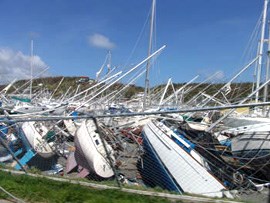SooToday.com has been asked by the Sault Ste. Marie branch of the Canadian Red Cross to forward this advisory to our readers:
************************** Hurricane Ivan: Canadian Red Cross launches appeal to support relief efforts in the Caribbean
(OTTAWA, September 10, 2004) – The Canadian Red Cross is responding to Hurricane Ivan — the most powerful hurricane to hit the Caribbean in a decade — by sending cash and preparing to deploy staff specialized in logistics and water sanitation to the region.
Red Cross is contributing $50,000 in addition to the $50,000 from Scotiabank earmarked for Grenada.
Canadians are encouraged to support the relief efforts by making a cash donation in support of the International Red Cross' worldwide preliminary appeal for $1.79 million.
Funds raised will help provide shelter materials, food, blankets, kitchen sets, hygiene items and jerry cans to 10,000 of the most vulnerable people affected.
In recent days, Hurricane Ivan has left a horrific path of destruction—hitting some of the poorest countries in the Eastern Caribbean.
It has wreaked havoc — starting out on September 5 as a category 4 hurricane, then gathering strength to become a category 5 storm, the highest possible.
It has left death and destruction in its wake, hitting Barbados, St. Lucia, St. Vincent, the Grenadines, Trinidad and Tobago and is now approaching Jamaica, Cuba, the Cayman Islands and Florida.
Ivan is carrying sustained winds of nearly 225 kilometres per hour.
The situation in Grenada is extremely serious.
Twelve people have died and officials fear that the death toll will continue to rise.
Approximately 90 percent of the country’s homes have been destroyed or damaged.
About 60 per cent of the country’s population of 95,000 is left homeless and several thousands of people are living in 47 shelters.
There is no water or electricity and the island has limited cell phone coverage.
The Grenada Red Cross Society headquarters was among the most seriously damaged buildings.
It has now relocated its emergency operations centre to one of the shelters.
Regional Red Cross teams under the coordination of the Pan-American response Unit (PADRU) are already in Grenada, Jamaica, Cuba, the Bahamas and the Dominican Republic.
The Sub-regional office in Trinidad and Tobago is following the situation closely.
The International Red Cross is deploying a Field Assessment and Coordination Team (FACT) to both Grenada and Jamaica.
A British Red Cross Logistics Emergency Response Unit (ERU) has also been sent to Grenada.
"The destruction caused by Hurricane Ivan is devastating some of the most vulnerable countries in the Eastern Caribbean," says José Garcia-Lozano, Deputy Director, International Programs, Canadian Red Cross.
"The people impacted by this disaster urgently need assistance to simply cover their basic needs for items such as food, clean water and shelter. Through the generous support of individual Canadians and corporations, we are one step closer to making that help a reality."
Canadians requesting information about their family members in the affected region may contact their local Red Cross office.
At present, the priority is on the emergency relief operation—but in the coming days the Red Cross, through its Restoring Family Links program, will begin processing tracing requests.
Canadians wishing to make a financial donation may donate at www.redcross.ca, call 1-800-418-1111 or contact their local Canadian Red Cross office.
The 24-hour toll free line accepts Visa and MasterCard.
Cheques should be made payable to the Canadian Red Cross, earmarked "2004 Hurricane Relief" and mailed to Canadian Red Cross National Office, 170 Metcalfe Street, Suite 300, Ottawa, Ontario K2P 2P2.
For information on how Red Cross manages donations, please visit the "How We Care For Your Donations" section at www.redcross.ca.
Donations of goods are not accepted.
*************************
